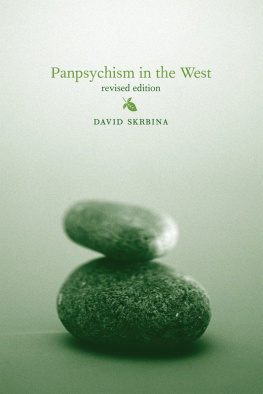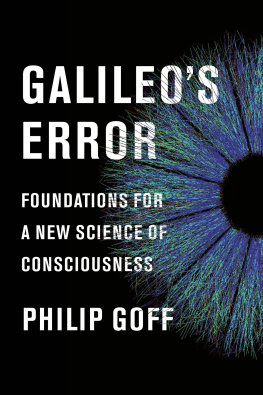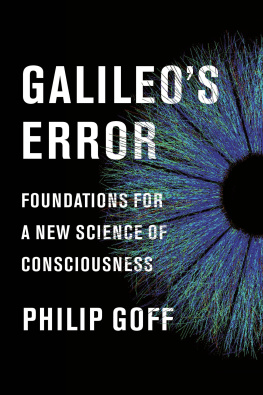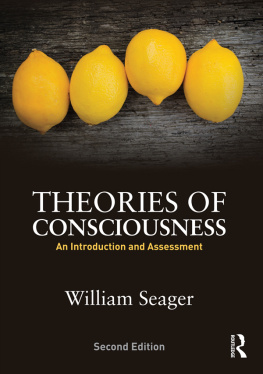
Panpsychism in the West
revised edition
David Skrbina
The MIT Press
Cambridge, Massachusetts
London, England
2017 Massachusetts Institute of Technology
All rights reserved. No part of this book may be reproduced in any form by any electronic or mechanical means (including photocopying, recording, or information storage and retrieval) without permission in writing from the publisher.
Set in ITC Stone Sans Std and ITC Stone Serif Std by Toppan Best-set Premedia Limited. Printed and bound in the United States of America.
Library of Congress Cataloging-in-Publication Data
Names: Skrbina, David, author.
Title: Panpsychism in the West / David Skrbina.
Description: Revised edition. | Cambridge, MA : The MIT Press, 2017. | Includes bibliographical references and index.
Identifiers: LCCN 2016059702 | ISBN 9780262534062 (pbk. : alk. paper)
eISBN 9780262341516
Subjects: LCSH: Panpsychism--History.
Classification: LCC BD560 .P35 2017 | DDC 141--dc23 LC record available at https://lccn.loc.gov/2016059702
ePub Version 1.0
dedicated to all those who seek alternatives to the mechanistic worldview
Acknowledgments
There are of course many individuals, past and present, to whom I owe inspiration and gratitude. Among them are Peter Reason, Brian Goodwin, Alan Rayner, and Chris Clarke, all of whom provided encouragement and feedback when this material was still a work in progress. In more recent years, many people contributed to my thinking on this subject, and dialogue with them has been most helpful; I particularly want to acknowledge Ludwig Jaskolla, Phil Goff, Gordon Globus, Bill Seager, Riccardo Manzotti, Giulio Tononi, Pierfrancesco Basile, Michael Blamauer, and Galen Strawson.
A special acknowledgment goes to my great friend, mentor, and peerless source of inspiration, Henryk Skolimowski.
1 Panpsychism and the Ontology of Mind
1.1The Importance of Panpsychism
Few topics in the history of philosophy have proved as persistently inscrutable as the mind. In many ways, we scarcely know more than the ancient Greeks did. The brain, of course, is much better understood today, as are most aspects of human physiology. Physically speaking, our knowledge has expanded greatly. Mentally speaking, though, our progress has been much less impressive. We have many new, intricate philosophical concepts and tools at our disposal, and yet philosophers of mind seem unable to reach any substantial consensus about what the mind is, or how it is related to the body. The enigmatic nature of mind is so pervasive and so compelling that some current philosophers have given up on the problem, calling it intractable or unsolvable in principle. Even granting this, philosophy of mind will not cease. We will continue to inquire into its natureour natureand thus will continue to examine one of the fundamental riddles of existence.
The many difficulties surrounding the concept of mind seem to call for a deep reexamination of the entire situation. I begin with two basic assumptions that are held by nearly all present-day theorists: (1) that mind is limited to humans and perhaps the higher animals, and (2) that mind is somehow dependent on or reducible to the physical substrate of the brain. Point 1 is usually taken for granted and rarely argued for, even though there are intrinsic difficulties with establishing, for example, what exactly constitutes a higher animal and how we can know that only they have minds. Point 2 implies a belief that there is something fundamentally, ontologically unique about the brains of higher animals, and that they alone among all the physical structures of the universe can support mental processes. This second point seems reasonable at first glance, but upon reflection is almost inconceivable; we have not a trace of a theory that would account for such a situation, and there is no physiological data that would support it. Certainly there are unique physical characteristics of the human brain, among them the number and density of neural cells, the modes of input for sensory information, and the language-processing centers. These factors most likely account for our uniquely human mental capabilities, including our powers of abstract reasoning, our ability to experience rich emotions and feelings, to hold complex beliefs, and the like. But we have found nothing so unique as to account for the presence of a mind in humans alone. In any case, what is at issue here is not the nature of the uniquely human mental capabilities, but rather a general understanding of the phenomenon of mind in its broadest sense.
Many thinkers, past and present, have seen fit to challenge these two assumptions. On the basis of their philosophical reasoning, intuitive insights, and investigations into the natural world, they came to reject such assumptions as largely groundless and unjustifiable. They saw no compelling reason to limit mind or mental capacities to humans and higher animals. On the contrary, they found justification for seeing mind in the lower animals, plants, microbes, and even the inorganic realm. On such a view, mind becomes a general and perhaps fundamental property of nature. Mind would then exist, in some form, in all things. Broadly speaking, this is the view known as panpsychism.
To put a bit more structure to our definition, we may say that panpsychism holds that all things have a mind or a mind-like quality. It is an ancient concept, dating back to the earliest days of both Eastern and Western civilizations. In fact, until the past hundred years or so, panpsychism was a respected and widely held viewpoint. In many cases it was regarded as obvious and in no need of defense. But with the rise of analytic, linguistic, and anti-metaphysical philosophy in the early twentieth century, panpsychism was pushed to the sidelines of intellectual discourse. Even today, it is spoken of in dismissive tones by many orthodox philosophers. In the past few decades, though, it has witnessed something of a renaissance, both in and outside conventional analytic circles. The time is right, then, to conduct a detailed investigation of the phenomenon of panpsychism within Western philosophy.
If we take panpsychism to be the view that all things possess mind, this raises at least two immediate questions, one concerning the nature of things and the other concerning the nature of mind. Generally speaking, panpsychist philosophers attempt to make some progress on both central issues; that is, they attempt to elaborate on precisely which entities in the universe qualify as mind-possessing, and they attempt to describe in some detail the mental qualities of such objects. I should note here that panpsychism doesnt entail that every conceivable entity possesses mind. For example, valid panpsychist theories may exclude composite or collective entities, such as piles of sand, or tables and chairs. They may exclude physical ultimates such as atomsor they may include only physical ultimates. They may include matter but exclude various forms of energy. They may exclude conceptual or logical entities, such as numbers. I will therefore interpret panpsychism in a soft sense: that mind is very widespread, is nearly universal in extent, and crosses deeply into the inorganic realm. The precise extent of mind depends on the particular theory at hand.
The nature of things and the nature of mind are, of course, central to many aspects of philosophy. Panpsychism, however, lies at a unique intersection of the two concepts, in that mind is seen as fundamental, in some sense, to the nature of existence and being. If all things (appropriately defined) have mind, then any theory of mind is necessarily a theory about ontology, about the nature of extant things. This is unlike most other notions of mind, virtually all of which either make no statement on which objects possess it, or make implicit or explicit assumptions about its confinement to humans or, occasionally, the higher animals. Panpsychism alone is at once a conception of mind and a conception of reality.
Next page








